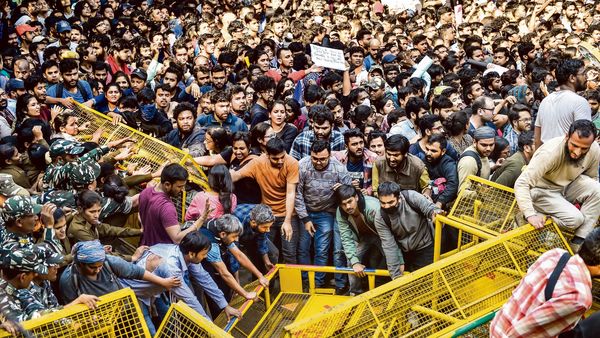
The protest mounted by students of JNU may seem to be about hostel charges being raised to a reasonable level. A closer look, however, shows that it is about equality of opportunity
Students of Delhi’s Jawaharlal Nehru University (JNU) have been on a warpath with the administration over the past few weeks. On Monday, a large group of protesting students embarked on a march from their campus to Parliament, defying prohibitory orders. The stated aim was to protest arbitrary fee hikes, though some of their discontent can be traced to their being kept out of varsity decisions. A large monthly service charge was imposed on hostel residents, purportedly to pay for sanitation work and staff wages. It was reportedly fixed at ₹1,700 a month, but the administration subsequently decided to bill actual expenses. Further, JNU’s monthly room rent was raised from ₹10 to ₹300 for a double-occupancy room, and from ₹20 to ₹600 for a single-bed unit. Students were also asked to pay for water and power consumption. The agitators alleged that JNU’s democratic traditions had been given short shrift, with such decisions being thrust upon them, and that its education would go beyond the reach of the underprivileged—which would be against the spirit of its character.
Given the cost of living off-campus in the city, the sums that students are being asked to pay may not seem very high, and some escalation was inevitable. But the steepness of the hikes not only appears harsh, the public debate on what JNU students “deserve” seems to have got coloured by factors that have little to do with education. It is no secret that their subsidized residential quarters attract the opprobrium of those who take a dim view of the largely leftist political activism that many of them seem engaged in. But this aspect is irrelevant. To the extent that state-supported higher education is part of the country’s social contract, so to speak, nobody should grudge the public money spent on top universities. Also, if campus governance structures make space for student representation, then this should be followed. Awkwardly, however, JNU’s administration is yet to notify this year’s students’ union. In effect, students have been left voiceless. As a result, matters that could be resolved through dialogue have morphed into civil disturbances nobody can be proud of.
Since its inception, JNU has held out hope to those at the bottom of the pyramid aspiring to gain a fine education and make something of their lives. Its 2017-18 annual report said that about 40% of those selected in that academic year came from families earning under ₹12,000 a month. If equality of opportunity has to work as a principle, then all institutions of higher education in India should ideally admit bright students regardless of their ability to pay. That is what has made America’s Ivy League universities shine, and it is what JNU has tried. This effort should be strengthened, not weakened. There are many cases in India of public money being wasted, but education is not among them. In fact, this is one sector that needs far greater investment than it has got all these decades. Like healthcare, it should be a state provision even at the top level. JNU is the alma mater of Union ministers, bureaucrats, social scientists and even a Nobel laureate. It is a success model that we must preserve and strive to replicate across the country.
